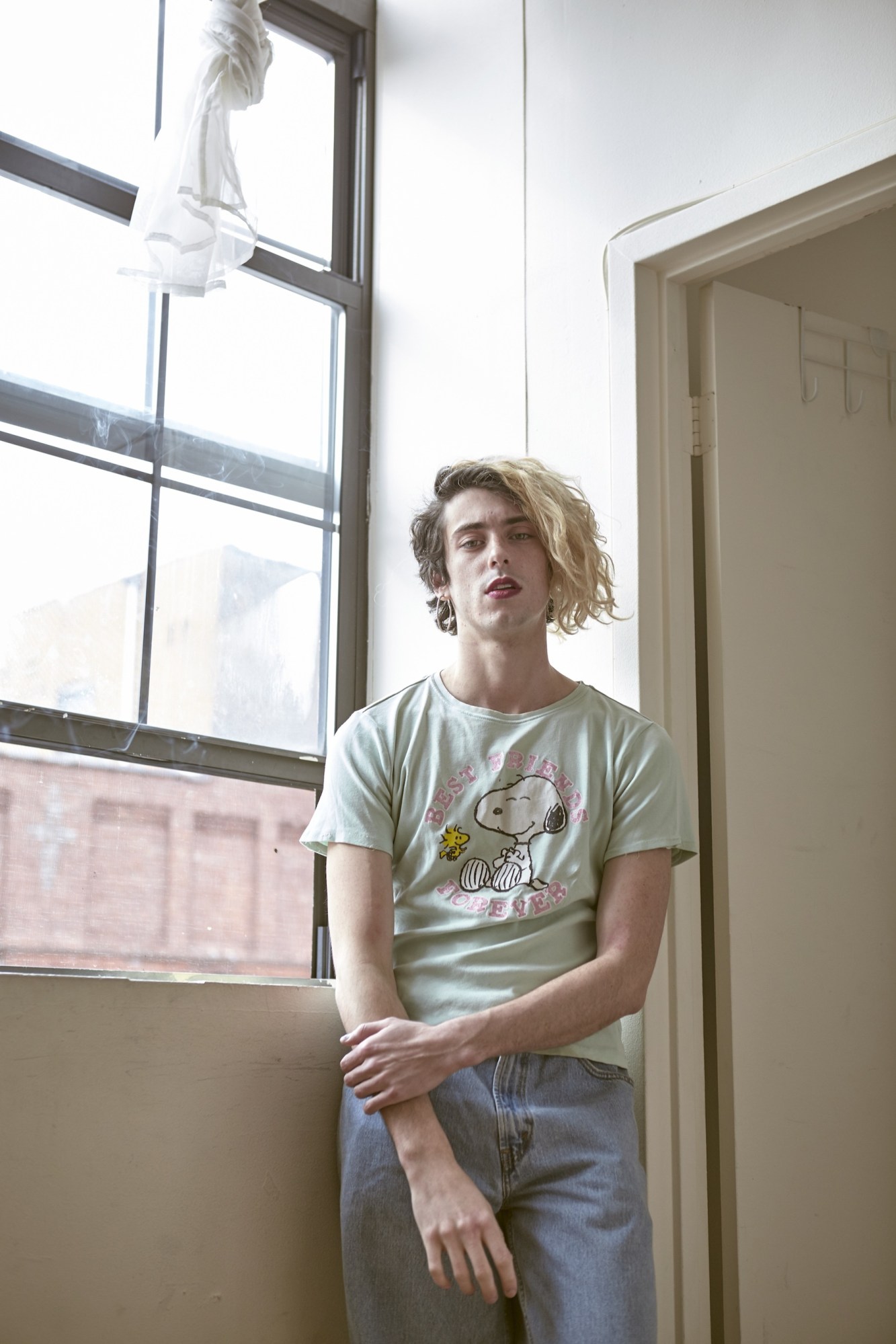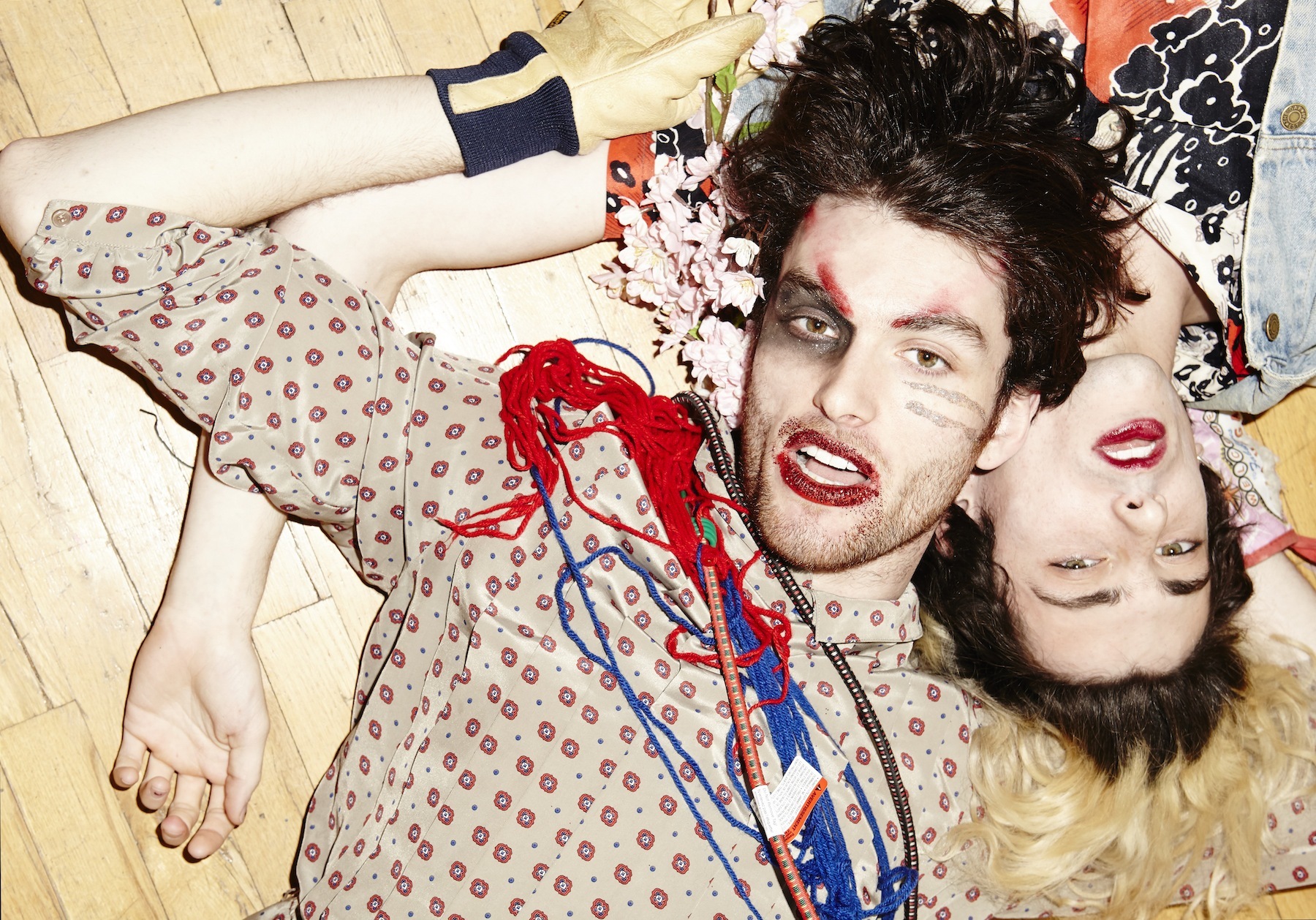There’s glitter in Ben Hopkins’ eyebrow. It’s faint — maybe it’s left over from last night’s show in Arcata, in northern California — but it’s a preview, a sparkly vestige, that suggests tonight’s PWR BTTM show will not be the sort of punk show most people are used to seeing.
Liv Bruce floats towards the leather couch at Rickshaw Stop, a small rock club for up-and-comers in San Francisco. The drummer of the two is reveling in Hopkins’ description of the moment they met, during Bruce’s first weekend at Bard. As the story goes, Bruce “sashayed” into Hopkins’ apartment, uninvited and unannounced, to what was not, in fact, a party like they thought.
“I was like, who is this Nancy?” Hopkins remembers. “I want to be that queer.”
Queerness and punk are not often partnered music descriptors, but in the case of PWR BTTM, a duo often outfitted in sequined dresses and red lipstick, heaving rough-edged, confessional punk choruses about boys who got away seems to make a lot sense. Their sound is loud and grungy, and their lyrics are excessively candid, but their delivery is even more compelling; only very rarely do those kind of thrashing guitar lines come from someone wearing so much glitter.
On a break before a show in San Francisco, Bruce and Hopkins sat down to talk about their newest album, Ugly Cherries, drag, and who their new bass player should be.
Other than the catchiness of your music, what about your lyrics or aesthetic do you think people identify with?
Hopkins: I always say you write music to make yourself feel less alone. I think it’s Gertrude Stein who says, Take your personal myth, make it iconic. Let people relate to it. We can only ever tell our stories as two queer people.
Bruce: A lot of my songs are a means to clarify what I think so I can tell someone. I think pretty much everything on Ugly Cherries is something that led to a conversation about something that I hadn’t really known how to say.
Have people come up to you and said, like, “I really like your song, I’ve related it to my own life”?
Hopkins: Yeah, it’s really flattering. Well, flattering is a narcissistic word. I remember when I first met Frankie Cosmos, I went up and explained why songs mattered to me for specific reasons. The coolest thing about music is not being a musician; it’s being a fan. There’s no shame in being “a fan.”
Bruce: I think there have been a select few moments where someone says to you what they identified with [in] the song, and it’s something that teaches you something about yourself.
Hopkins: Someone once described our song “1994” as a nihilist love song. I like to think of myself as very much an optimist and I was like, “Oh shit, it really is.” It’s weird when someone else describes your own music to you and you get it.

You make a lot of references to relatable, mundane occurrences in life — the shower, keeping the bed warm — and use them to define intimacy. Do you find you approach everyday life as art in that way?
Hopkins: I’d say so.
Bruce: I don’t know if I approach it that way, but it’s the way I interpret everyday life. Especially when you study something as broad as performance, like Ben and I. When you have that lens with which to look at your entire life, you can’t stop seeing performances.
Everything is more beautiful.
Bruce: Yeah. Since we’re a two-piece we always joke about the search for PWR BTTM’s bass player. Whenever we see someone really remarkable in some way, we’ll be like, “Oh, that’s our new bass player.” That’s kind of our way of expressing to each other the level of ridiculous theatricality that’s on the same level as our own that we encounter every day in life. Our next bass player can be a three-year-old girl having a temper tantrum, or a 60-year-old truck driver at a rest stop.
Hopkins: I had my tarot cards read on this tour, and I got the two of clubs, and [in it] the guy spilled cups and is just standing by a river. That’s how I was feeling so intensely at the moment, it made me feel less ridiculous. That identification is what I find in good art, like people I really admire – they’re giving you that kind of output.
Bruce: That’s such a fascinating phenomenon — the alienation that comes from being able to project the self onto anything…In one way, [we] millennials are obsessed with ourselves to the extent where we need to point out all these things that we identify with. But [that] also makes the self nothing, and [instead] this beautiful thing that can be thrown onto anything.
Hopkins: That’s what you create your image on, like through community and other things, whether it’s music or art. That’s why music is so important, because unlike theater or visual art you can take it with you, anywhere you are.
When you’re in drag onstage, do you feel like that’s you, yourself? Or do you feel like you take on a new identity?
Hopkins: It’s a little bit past that. It’s like, Ben Hopkins, me, is very self-aware, embarrassed, constantly plagued by regret and mistakes I’ve made in the past. Me on stage is like, that is the only moment that matters. I am purely that.
Do you write music as Ben on stage? Or Ben in real life?
Hopkins: I think when I’m alone in my apartment, sweaty, playing guitar really loud, I’m closer to that.
Bruce: I’m the most honest version of myself onstage, especially because I’m a Pisces. I always feel like three different ways about something. I need to spend hours soaking in myself to find out what I really think.
What are your aesthetic inspirations and goals?
Hopkins: I’m going to look like I really care. I went through a lot of effort to get this dress and be crazy-looking. The fact that [some bands] spend nine hours trying to look like [they] rolled out of bed is not much different. No one is effortlessly cool. It’s all drag.
Bruce: A big [inspiration] is Dr. Frank-N-Furter. He gives the impression of comfort in how he looks and I think that’s the thing. I was thinking about how to describe the aesthetic I’m interested in, and it’s not about effortless because effortless is bullshit. It’s more about comfort.
It takes a lot of effort to be comfortable in that kind of gender fluidity.
Bruce: Yeah, for some people it’s really easy to access gender ambiguity in their presentation and there are some people for whom it’s really difficult. The people I’m visually interested in tend to be people who in some way or another showcase that question “What does it take for different bodies to be read a certain way?” [That’s] what makes my heart tick a little bit faster.
Credits
Text Alyssa Pereira
Photography Sam Evans Butler
